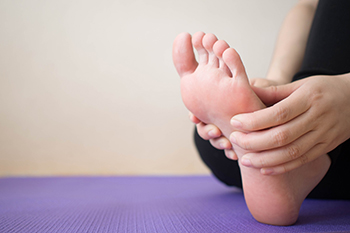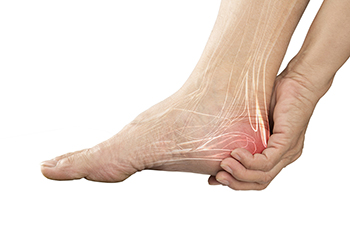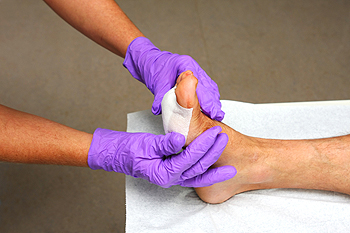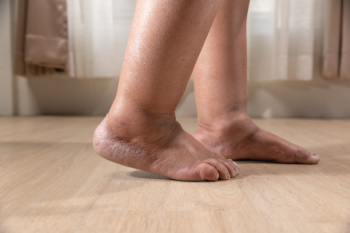Connect With Us
Blog

The feet can reflect underlying liver conditions through several noticeable changes. Yellowing of the skin and nails, known as jaundice, is a common sign of liver dysfunction and may first appear subtly in the toes or soles. Swelling in the feet and ankles can result from fluid buildup when the liver is not processing fluids properly. The appearance of spider veins on the feet or lower legs may also indicate poor liver function due to changes in blood flow. Itchy feet can be caused by a buildup of bile salts in the bloodstream, often linked to liver issues. Clubbing of the toes, where the tips become rounded and the nails curve downward, may point to long-standing liver disease. If you have any of the above symptoms, it is suggested that you consult a podiatrist who can provide appropriate treatment and discuss the connections between possible liver issues.
When dealing with systemic disease of the feet, it is extremely important to check the affected areas routinely so that any additional problems are caught quickly. If you have any concerns about your feet and ankles contact one of our doctors from Intercoastal Medical Group. Our doctors will assist you with all of your podiatric needs.
Systemic Diseases of the Feet
Systemic diseases affect the whole body, and symptoms usually are displayed in the feet. This condition can make a patient’s ability to walk unbearable. Systemic diseases include gout, diabetes mellitus, neurological disorders, and arthritis.
Gout – is caused by an excess of uric acid in the body. Common symptoms include pain, inflammation, and redness at the metatarsal/phalangeal joint of the base big toe. Gout can be treated by NSAIDs to relieve pain and inflammation, and other drugs that lower the acid levels in the body.
Diabetes mellitus – is an increase in the level of blood sugar that the body cannot counteract with its own insulin. Failure to produce enough insulin is a factor in Diabetes.
Diabetes of the Feet
Diabetic Neuropathy – may lead to damaged nerves and affect the feet through numbness and loss of sensation.
Peripheral Vascular Disease – can restrict the blood flow to the feet, and often times lead to amputation of the feet.
If you have any questions please feel free to contact our offices located in Bradenton, and Sarasota, FL . We offer the newest diagnostic and treatment technologies for all your foot and ankle needs.

Heel pain in seniors often results from age-related changes in the feet, such as tissue wear, bone thinning, or chronic strain. A common cause of heel pain is plantar fasciitis, which involves inflammation of the thick band of tissue that connects the heel bone to the toes. This condition often leads to sharp pain during the first steps in the morning. Heel spurs, or bony growths beneath the heel, may develop alongside plantar fasciitis and contribute to discomfort. Achilles tendinitis can also cause heel pain, particularly at the back of the ankle, due to overuse or stiffness. Arthritis in the foot joints may lead to inflammation and limited mobility. Seniors are also at greater risk of stress fractures, bursitis, and heel pad syndrome, which results from thinning of the natural cushioning beneath the heel. Tarsal tunnel syndrome or peripheral neuropathy are sources of nerve-related heel pain. A podiatrist can identify the underlying cause of your heel pain. Effective treatment options include custom orthotics, night splints, injections, or surgery. If you are experiencing heel pain, it is suggested that you schedule an appointment with a podiatrist for an exam and a diagnosis to determine the best treatment plan for you.
Many people suffer from bouts of heel pain. For more information, contact one of our doctors of Intercoastal Medical Group. Our doctors can provide the care you need to keep you pain-free and on your feet.
Causes of Heel Pain
Heel pain is often associated with plantar fasciitis. The plantar fascia is a band of tissues that extends along the bottom of the foot. A rip or tear in this ligament can cause inflammation of the tissue.
Achilles tendonitis is another cause of heel pain. Inflammation of the Achilles tendon will cause pain from fractures and muscle tearing. Lack of flexibility is also another symptom.
Heel spurs are another cause of pain. When the tissues of the plantar fascia undergo a great deal of stress, it can lead to ligament separation from the heel bone, causing heel spurs.
Why Might Heel Pain Occur?
- Wearing ill-fitting shoes
- Wearing non-supportive shoes
- Weight change
- Excessive running
Treatments
Heel pain should be treated as soon as possible for immediate results. Keeping your feet in a stress-free environment will help. If you suffer from Achilles tendonitis or plantar fasciitis, applying ice will reduce the swelling. Stretching before an exercise like running will help the muscles. Using all these tips will help make heel pain a condition of the past.
If you have any questions please contact our offices located in Bradenton, and Sarasota, FL . We offer the newest diagnostic and treatment technologies for all your foot and ankle needs.

Debridement is the process of removing dead or infected tissue from foot wounds or ulcers to help the body restart the healing process. When unhealthy tissue is present, it can delay healing and increase the risk of infection. By clearing out this tissue, debridement encourages the growth of healthy skin, reduces the chance of complications, and may minimize long-term scarring. There are several types of debridement, including enzymatic, autolytic, mechanical, and sharp methods. The method chosen often depends on the severity and condition of the wound, as well as a patient’s overall health. In some cases, surgery may be required, particularly for deep or severely infected wounds that do not respond to conservative options. A podiatrist can evaluate the wound and determine the most effective way to promote healing. Podiatrists are trained to manage foot, toe, and ankle wounds safely and effectively, and they provide continued monitoring throughout recovery to help prevent further issues. If you have foot wounds or ulcers that are not healing properly, it is suggested that you schedule an appointment with a podiatrist for an exam and ongoing wound care.
Wound care is an important part in dealing with diabetes. If you have diabetes and a foot wound or would like more information about wound care for diabetics, consult with one of our doctors from Intercoastal Medical Group. Our doctors will assess your condition and provide you with quality foot and ankle treatment.
What Is Wound Care?
Wound care is the practice of taking proper care of a wound. This can range from the smallest to the largest of wounds. While everyone can benefit from proper wound care, it is much more important for diabetics. Diabetics often suffer from poor blood circulation which causes wounds to heal much slower than they would in a non-diabetic.
What Is the Importance of Wound Care?
While it may not seem apparent with small ulcers on the foot, for diabetics, any size ulcer can become infected. Diabetics often also suffer from neuropathy, or nerve loss. This means they might not even feel when they have an ulcer on their foot. If the wound becomes severely infected, amputation may be necessary. Therefore, it is of the upmost importance to properly care for any and all foot wounds.
How to Care for Wounds
The best way to care for foot wounds is to prevent them. For diabetics, this means daily inspections of the feet for any signs of abnormalities or ulcers. It is also recommended to see a podiatrist several times a year for a foot inspection. If you do have an ulcer, run the wound under water to clear dirt from the wound; then apply antibiotic ointment to the wound and cover with a bandage. Bandages should be changed daily and keeping pressure off the wound is smart. It is advised to see a podiatrist, who can keep an eye on it.
If you have any questions, please feel free to contact our offices located in Bradenton, and Sarasota, FL . We offer the newest diagnostic and treatment technologies for all your foot care needs.

Swelling in the feet can result from various factors that affect circulation and fluid balance. Long periods of sitting or standing can lead to fluid buildup due to reduced blood flow, causing discomfort and puffiness. Certain medical conditions, including heart, kidney, or liver disease, can contribute to swelling by affecting the body's ability to regulate fluids. A high salt intake may also cause water retention, leading to noticeable swelling in the lower extremities. Blood clots can obstruct circulation, resulting in one-sided swelling accompanied by pain or redness. Additionally, wearing tight footwear restricts movement and can worsen fluid accumulation. A sedentary lifestyle may also contribute to poor circulation, increasing the risk of swelling. If you notice your feet and ankles are swollen, it is suggested that you visit a podiatrist who can determine what the cause is, and offer appropriate relief and treatment solutions.
Swollen feet can be a sign of an underlying condition. If you have any concerns, contact one of our doctors of Intercoastal Medical Group. Our doctors can provide the care you need to keep you pain-free and on your feet.
Swollen feet are a common ailment among pregnant women and people who stand or sit for extended periods. Aging may increase the possibility of swollen feet and patients who are obese often notice when their feet are swelling too. There may be medical reasons why swollen feet occur:
- Phlebitis - A condition that causes the veins to become inflamed and can also cause leg pain.
- Liver disease - This may lead to low blood levels of albumin which is a protein. This can cause fluid in the blood to pass into the tissues and several areas of the body can become swollen.
- Heart failure - When the heart doesn’t pump properly the blood that is normally pumped back to the heart can pool in the veins of the legs causing swollen feet.
- Kidney disease - One of the main functions of the kidneys is releasing excess fluid in the body. This type of condition can make it difficult for the kidneys to function properly, and as a result the feet may become swollen.
- Deep-vein thrombosis (DVT)- This is a serious condition where blood clots form in the veins of the legs. They can block the return of blood from the legs to the heart which may cause the feet to swell. It is important to be treated by a podiatrist if this condition is present.
Swollen feet can also be caused by bone and tendon conditions, including fractures, arthritis, and tendinitis. Additionally, there may be skin and toenail conditions and an infection may cause the feet to swell. Patients who take medicine to treat high blood pressure may be prone to getting swollen feet.
Many patients elevate their feet to help relieve the swelling and this is generally a temporary remedy. When a podiatrist is consulted the reason behind the swelling can be uncovered and subsequently treated.
If you have any questions please feel free to contact our offices located in Bradenton, and Sarasota, FL . We offer the newest diagnostic tools and technology to treat your foot and ankle needs.
